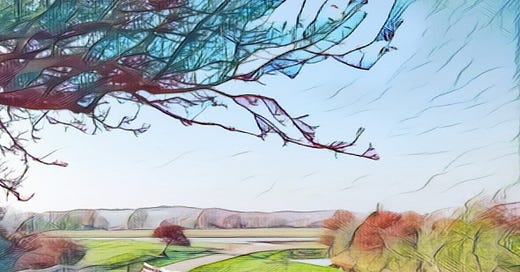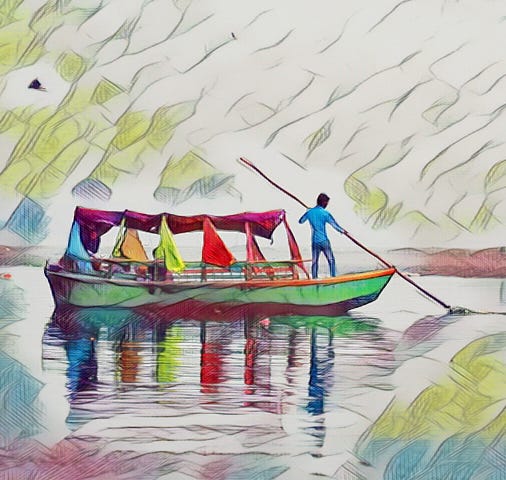While knowledge of the world is sought by quite a few,
the more sincere enquire about the nature of knower too
[BG 13.4]
Prologue
This booklet describes a walk taken up by Professor Gopinath and four PhD students in Oxford. A walk along the river, through the parks and into the meadows. And a walk exploring the meanings of knowledge, through various life experiences and into profound depths of fulfillment.
Scene
It was evening time in Oxford. The sun was setting but was still above the horizon. It had been a busy day for Professor Gopinath. But after a quick shower, he was ready for his evening walk. Today he was joined by a group of Ph.D. students. They assembled at South Park. Some were meeting the Professor for the first time, but they had heard about his erudite discussions from their friend Ravi.
They decided to walk towards the Port Meadows. More than a workout, this was a leisure walk. As they descended the hill, they beheld the picturesque sight of Oxford town. Bedecked with its dreaming spires, the town seemed to carry impressions of scholarship in its every brick. The setting sun marked the closing of a hectic day and heralded a contemplative evening. The cool evening breeze soothed the mind. Breaking the silence, Professor Gopinath asked a question.
Professor: You are here to do a Ph.D. You are here in the pursuit of knowledge. What is knowledge?
The students hesitated initially, but the encouragement and welcoming demeanor of the Professor made them feel comfortable. One of the students, Kanti, spoke.
Knowledge and Timely Decisions
Kanti: I would probably briefly define knowledge as a true justified belief.
Professor: Nice. Could you please elaborate on this?
Kanti: As a scientist, I believe in what I observe - what the data and statistics show. That is what I call knowledge. E.g., when I experiment, I see something, hear something, etc. The collection of those is knowledge.
Professor: Thanks. This is a nice perspective - knowledge is a collection of experiences. Let us refine it further. Suppose I give you a collection of newspapers from different countries. Would you call that knowledge?
Kanti: Well, I guess so.
Professor: Then how would you search for an answer to any question you have? If you are sick and go to a doctor for treatment, the doctor may give you a collection of books; will that be called knowledge? You may even go to the internet to find a treatment or to a bookstore selling medical textbooks.
Kanti: I would need some compressed form of knowledge. I go to a doctor to save time. Otherwise, I may spend an immense amount of time searching for what I require, i.e., treatment in this case. A doctor can save me time. And also, there is belief in me that he is qualified. That belief also should be properly justified, e.g., he has done MBBS and MD from reputed institutes.
Professor: Indeed, you go to a doctor to save time. Time is a finite asset. I have limited time, and I have a decision to make. The condensed knowledge should help me in making a decision quickly. So, I go to an expert for that knowledge to help me make that decision [BG 13.8 iii]. That is what you call knowledge.
Kanti: Right.
Leaving South Park, they entered Headington Hill Park, where tranquil trees and pathways welcomed them.
Knowledge of Fundamental Causes
Subal: My view is a little different. In my view, knowledge is the actual truth. That which is behind everything. If you know that, the truth, you know all things. E.g., in Physics, we can see different forces behind the observations.
Professor: I can help refine your thoughts. Newton saw an apple falling. Everyone sees apples falling. But Newton tried to find what is behind it; he formulated it as gravitational force. Not just the apple is falling, but also pencils and glass are falling. What is behind that makes things fall? That is what he formulated as gravitational force.
Subal: Yes. If you know the truth, you understand everything you experience around you. In Physics, scientists have been endeavoring to find a unified theory - the most fundamental law behind everything.
Kanti: I am not sure if any such law may exist, but I would rather say a more fundamental theory. It is relative. For example, Bohr’s theory is more fundamental than that of Rutherford. Likewise, some theories are more fundamental than Bohr’s.
Professor: So knowledge means not just looking at the surface form but something more fundamental [BG 13.12 ii].
Subal: This means knowledge is a process where we keep refining our understanding of the world to get to more and more fundamental relations.
Professor: Well said.
(Another student, Neeti, spoke.)
Neeti: I would like to add that why look only at the surface forms in terms of experiences from our gross five senses? Surface forms can also include experiences that may not be measurable by external devices but are nevertheless experienced by an individual. These may include one’s thoughts. These thoughts may be about the gross experiences one had previously. These may also include one’s intelligence to organize those thoughts and plan actions. And even the value or desirability one associates with one’s experiences.
Professor: Very good. We get gross experiences from our senses but organize them with intelligence. Physics is not done outside, with external devices, but is done inside, with intelligence. In fact, the internal experiences or the experiences of mind and intelligence are so consistent. They have been long studied and organized into models that try to capture the structure of relationships existing there. The area of AI is an excellent example which all of you are very familiar with.
Neeti: So, at a meta-level, knowledge means understanding the mechanics of the world, both external and internal, and then organizing them in a way that is useful to us where we wish to apply it. But this would include understanding the fundamental factors or building blocks that cause the surface form or hold it in place.
Professor: Nicely summarized. More on intelligence and fundamental building blocks some other time.
Crossing the Marston Road, they reached a trail along the Cherwell river, which actually appears no more than a canal. They could see swans frolicking. The evening breeze grew cooler, partly due to moisture from the river and the surrounding trees.
Knowledge and Utility
Neeti: I have another dimension to add that knowledge should help me live my life delightfully.
Professor: Interesting. This brings another perspective on what we discussed. We have a question, and we should approach an expert who can give us condensed knowledge by which we can make a decision quickly. But what is the question that one asks? One may ask how many windows are in the academic building or how many employees are in the dean’s office. However these questions may not help one as a Ph.D. student. So, you are associating knowledge with a purpose. The question one asks should have a purpose.
Neeti: Yes. And the purpose is to simplify our lives and live well.
Kanti: This is a particular question, one of many questions one may ask.
Professor: What we are discussing is — are there some guiding principles when we ask a question?
Neeti: I think utility is the principle.
Kanti: But everything we study may not have a utility. For instance, we study history. It may not have any utility. Studying what Gandhi ji did may not make my life better.
Neeti: Studying what Gandhi ji did may help me learn something that may help me improve my life. For instance, while Gandhi ji was in London to attend a meeting, Winston Churchill disparagingly called him a half-naked fakir in public. Instead of retaliating in a similar contentious spirit, Gandhi ji took it as praise and said next time he wished he could come as a full-naked fakir. From this historical anecdote, one may learn humility and tolerance.
Kanti: Sure. But this may not be true every time. For instance, Bardeen invented the transistor. Knowing this may not help me. I am thankful to him, but what utility does this knowledge have for me?
Neeti: I agree. But would I be willing to spend my time and energy knowing this if it does not have any utility in my life? I would instead use my time and energy for my Ph.D.
Professor: Generally, when pursuing knowledge, we have to have some goal in mind; otherwise, we may just be lost. We have limited time, and we cannot keep exploring aimlessly forever. We can be much more productive if we have a definite goal. So, knowledge should have utility in progressing towards that goal. Nevertheless, the goal could be broad, and exploring it with our Ph.D. advisor may help us find helpful knowledge for that goal. But not having any goal at all is not advisable.
Neeti: And helping oneself is one such goal. We can pursue knowledge to help ourselves
.Professor: There is an instructive story in this regard. Once, a professor was on his way to a conference. On the way came a river which he had to cross. Fortunately, he found a boatman, but seeing the bad weather, the boatman hesitated. The professor was in a hurry and insisted on going, so the boatman agreed. On the way, the professor opened his laptop to refine his conference presentation while the boatman looked on inquisitively. Seeing the bewilderment of the boatman, the professor asked him, “Do you now know what a laptop is?” The boatman innocently replied, “No”. The professor was amazed. After giving him an introduction to the laptop, he reprimanded him for his illiteracy, saying, “This ignorance costs you 25% of your life.” But the poor boatman was still grappling with his inability to understand what a laptop meant. Realizing that the poor boatman did not know about electricity, the professor felt disgusted and remarked, “This ignorance costs you 50% of your life.” As they talked, a heavy storm arrived, making their boat unstable. Before toppling over, the boatman asked the professor, “Do you know how to swim?”. On hearing no, the boatman replied, “This ignorance will cost you 100% of your life.”
(The story generated some laughter, but the message's depth was well taken.)
Neeti: If my knowledge does not help me, what is the use of that knowledge?
Professor: I may spend an enormous amount of time surfing on my laptop or scrolling through social media apps on my smartphone. But survival is of utmost importance. Failure to recognize this is contrary to knowledge.
Kanti: Do you mean things that directly affect me are more important than those affecting me indirectly?
Professor: What do you think?
… to be continued
References
[BG x.y] Bhaktivedanta, A. C. (1972). Bhagavad-Gita as it is. Bhaktivedanta Book Trust. Chapter-x, text-y.
https://vedabase.io/en/library/bg/x/y/
[SB x.y.z] Bhaktivedanta, A. C. (1974). Śrīmad Bhagavatam: with the original Sanskrit text, its Roman transliteration, synonyms, translations, and elaborate purports. Bhaktivedanta Book Trust. Canto-x, chapter-y, text-z.
https://vedabase.io/en/library/sb/x/y/z/
Images generated using AI tools such as deepai.org and goart.fotor.com






